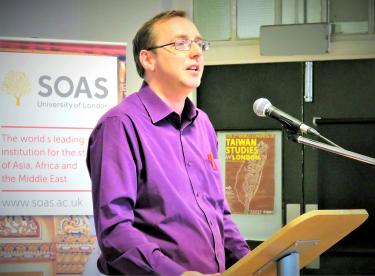taipeitimes.com
While China’s official ‘Xinhua’ and the ‘People’s Daily’ newspapers have millions of Twitter followers, Taiwan is lagging behind in the use of social media to project soft power
By Tony Phillips / Contributing reporter, in London
Taiwan should take a leaf out of Donald Trump’s social media handbook. More specifically, the US president’s use of social media, particularly Twitter, is something Taiwanese diplomats would be well advised to take note of.
Not tweets fired off at 3am, of course, but used wisely social media could serve as a vital tool for Taiwan, a nation that has more cause than most to seek to boost its profile and set its own agenda.
Professor Gary Rawnsley believes social media can help provide Taiwan with a louder voice on the world stage, but that opportunities are not being fully utilized, a view he expanded on during a presentation organized by London’s Centre for Taiwan Studies last month.
LOW PROFILE
The nation has a much lower profile than would be expected, a problem in large measure caused by China’s efforts to minimize Taiwan’s influence internationally but also resulting from factors as mundane as having a name that is often confused with Thailand.
To make the point, Rawnsley highlights an opinion poll showing that only 44 percent of Americans said that they knew something or a great deal about Taiwan, with just 29 percent aware that Taiwan has a democratic system of government.
Thus the nation struggles to be heard on the global stage, making it hard to engage with the rest of the world and, most damagingly, influence international opinion.
“Taiwan must ensure audiences are on a basic level familiar with Taiwan and that’s where social media can really help,” Rawnsley said.
Rawnsley, professor of Public Diplomacy in the Department of International Politics at Aberystwyth University, has a vested interest in pushing Taiwan’s case as a pioneer of Taiwan studies in the UK.
Meetings with Taiwan’s representative in the UK and staff at the Taipei Representative Office in London have seen the latter establish Twitter and Facebook accounts but elsewhere Rawnsley believes Taiwan is losing the social media war.
“Taiwan has a lot of soft power but it doesn’t really have much public diplomacy,” Rawnsley said.
Cross-strait comparisons are damning. Xinhua, China’s official press agency, has 7.96 million Twitter followers, the People’s Daily 3.04 million. The Taiwan Ministry of Culture by contrast has 834. Granted, there is a vast disparity in populations but as Rawnsley points out, although China is everywhere on Twitter, people in China cannot use it.
“Taiwan’s government is behind the curve in understanding the modern communications landscape,” Rawnsley said.
BUREAUCRACY
Citing interviews with staff from Ministry of Foreign Affairs and the former Government Information Office, Rawnsley concludes that the main problems are constraints stemming from bureaucratic structures within these organisations rather than any lack of understanding of social media, with generational differences exacerbating the situation.
The consequences are increasingly damaging.
Rawnsley said that online media have increased the speed of information flow, Tweets, for example, being instantly in the public sphere. Rapid responses are needed but bureaucracy works against this, leading to multiple levels of responsibility and buck passing.
“Social media increases the number and type of voices in a conversation,” Rawnsley said. “We’re all part of the conversation. This is a culture shock for diplomats who are used to talking to other diplomats or with journalists or political elites.”

No comments:
Post a Comment